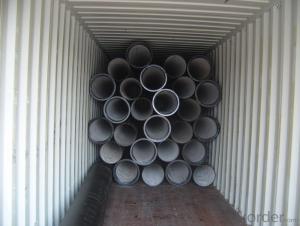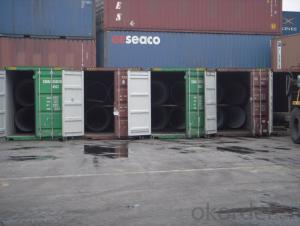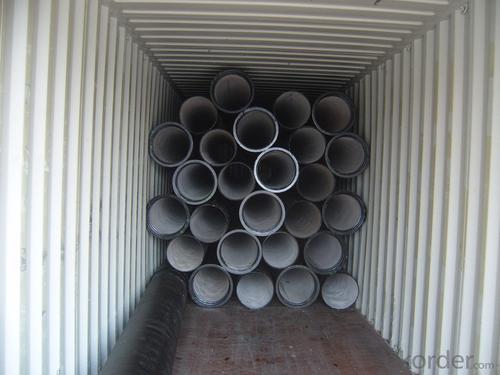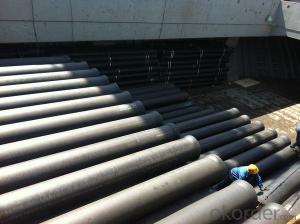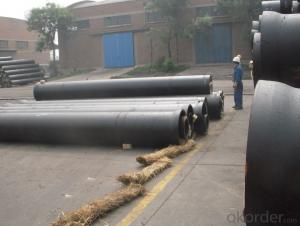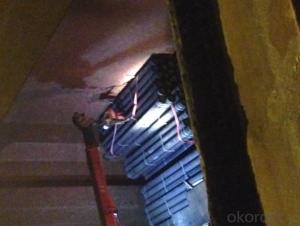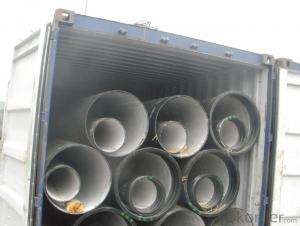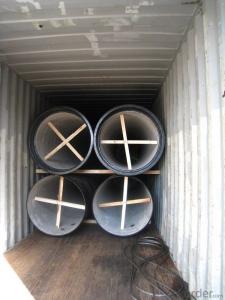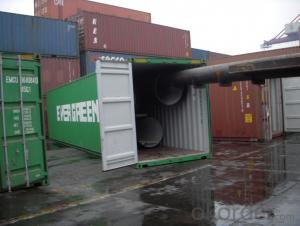DUCTILE IRON PIPE AND PIPE FITTINGS C CLASS DN100
- Loading Port:
- Tianjin
- Payment Terms:
- TT OR LC
- Min Order Qty:
- 23 pc
- Supply Capability:
- 3000 pc/month
OKorder Service Pledge
OKorder Financial Service
You Might Also Like
· Material : Ductile Cast Iron
· Size Range : DN 80mm to DN 2000mm
· Unit Effective Length : 6m or 5.7m
· Manufacture Standard: ISO 2531:1998/ EN 545:2006/EN 598:2007
· Annual capacity : 200,000 tons
· Coating Exterior: Zinc 130g/m2 according to ISO 8179-1 and bitumen coating 70 microns.
· Cement Interior: Portland Cement/ High Alumina Cement/ Sulphate Resisting Cement Lining according to ISO 4179
· Special requirements on external coating and internal lining can be applied
· We also provide accessories such as SBR/EPDM rubber gaskets, lubricant paste, pipe caps, PE sleeves, etc.
Additional Parts:
Each pipe is strictly inspected according to related standard to ensure permanently high performance.
Easy Installation at site and service free for life
Long Service Lifespan
Quotation will arrive you within 24hours once we get your inquiry.
We guarantee offering you a competitive price.
A copy of original inspection reports of pipes will be offered after shipment.
Photos of loading process will be sent to the customer after shipment effect.
We will follow-up the delivery progress after shipment effect and update to the customer on weekly basis.
- Q: What is the expected joint deflection capability of ductile iron pipes?
- Several factors can affect the expected joint deflection capability of ductile iron pipes. Generally, ductile iron pipes have a higher joint deflection capability compared to other pipe types. The joint deflection capability refers to how well a pipe joint can handle angular deflection or misalignment during installation or due to ground movement. Ductile iron pipes are known for their flexibility, which allows them to withstand external forces and movements without compromising their structural integrity. The expected joint deflection capability of ductile iron pipes typically falls within a range of 1 to 5 degrees, depending on the pipe diameter and wall thickness. This means that the pipes can safely accommodate angular deflection within this range without experiencing leaks or failures. It's important to consider that the joint deflection capability can also be influenced by factors like the type and quality of the joint restraint system, soil conditions, installation techniques, and pipe alignment. To ensure optimal joint deflection capability, it is crucial to follow proper installation practices and adhere to the guidelines provided by the manufacturer. All in all, ductile iron pipes have been designed and manufactured with a significant joint deflection capability, making them suitable for a wide variety of applications, including water distribution, sewer systems, and industrial piping networks.
- Q: Can ductile iron pipe be used for sewer and wastewater systems?
- Indeed, sewer and wastewater systems can make use of ductile iron pipe. Ductile iron, a variant of cast iron, boasts enhanced attributes such as heightened durability, strength, and flexibility. These characteristics render it apt for subterranean usage, encompassing sewer and wastewater systems. Ductile iron pipes possess resistance against corrosion and are capable of enduring high-pressure circumstances, rendering them perfect for the conveyance of sewage and wastewater. Furthermore, ductile iron pipes boast an extended lifespan and necessitate minimal upkeep, thereby making them a financially prudent alternative for sewer and wastewater infrastructure.
- Q: How do ductile iron pipes handle water hammer in high-rise buildings?
- Known for their durability and strength, ductile iron pipes are an excellent option for managing water hammer in high-rise structures. Water hammer, a common occurrence when water flow abruptly halts or changes direction in pipes, causes pressure surges that can strain and potentially harm the pipes. Engineered to withstand high-pressure scenarios, ductile iron pipes exhibit remarkable resistance to water hammer. With their high tensile strength, these pipes can endure sudden pressure changes without warping or fracturing. This feature is especially crucial in high-rise constructions where water distribution must accommodate various floor pressures. Furthermore, the outstanding corrosion resistance of ductile iron pipes bolsters their ability to handle water hammer. Over time, corrosion weakens pipes, making them more prone to failure during pressure surges. However, the corrosion resistance of ductile iron pipes guarantees their structural integrity even in high-pressure circumstances. Moreover, the flexibility of ductile iron pipes enables them to absorb and dissipate the energy generated by water hammer. Consequently, the overall system experiences minimal impact, reducing the potential for damage. Absorbing energy also contributes to minimizing noise and vibrations associated with water hammer, thus enhancing the efficiency and comfort of the water supply system. To summarize, ductile iron pipes are well-suited to manage water hammer in high-rise buildings. Their strength, corrosion resistance, and flexibility make them a reliable choice for delivering water under varying pressures while upholding the system's integrity.
- Q: What's the difference between cast iron pipe and steel pipe?
- Cast iron pipes (Cast, Iron, Pipe), cast cast pipe. Cast iron pipes are used for water supply, drainage and gas transmission lines. They include cast iron pipes and pipe fittings. Labor intensity is small. According to the casting method, it is divided into continuous cast iron pipe and centrifugal cast iron pipe, in which the centrifugal cast iron pipe is divided into sand mould and metal type two kinds. Divided into gray cast iron pipe and nodular cast iron pipe according to different material. According to the interface form, it is divided into flexible interface, flange interface, self anchored interface, rigid interface and so on. Among them, the flexible iron pipes rubber sealing ring; flange interface cast iron pipe flange fixed in the rubber pad, the flange gasket sealing; rigid interface cast iron pipe socket is large, straight pipe is inserted, sealed with cement, this technology has been basically eliminated
- Q: What are the typical pressure surge protection measures for ductile iron pipe?
- To ensure the integrity and longevity of ductile iron pipe, various measures are commonly employed to protect against pressure surges. These measures encompass the following: 1. Surge tanks serve as effective tools for absorbing and mitigating the impact of pressure surges on ductile iron pipe. These tanks are typically positioned strategically at critical points in the pipeline system, such as near valves or pump stations, providing a reservoir to contain excess pressure. 2. Air release valves are indispensable components within ductile iron pipe systems, serving the purpose of releasing trapped air and preventing the formation of air pockets. These valves maintain a stable pressure within the pipe, reducing the risk of pressure surges during operation or abrupt changes in flow. 3. Pressure relief valves are designed to safeguard ductile iron pipes by releasing excessive pressure when it surpasses a predetermined threshold. These valves are usually installed at strategic locations in the pipeline system and programmed to open when the pressure exceeds a safe limit, diverting the excess pressure to safeguard the pipe from damage. 4. Surge suppressors are devices installed in ductile iron pipe systems to absorb and dissipate pressure surges. These devices function as shock absorbers, lessening the impact of pressure fluctuations and protecting the pipe from harm. Surge suppressors are particularly effective in situations where pressure surges occur frequently or are severe. 5. Ensuring an appropriate pipe wall thickness is another critical measure for pressure surge protection in ductile iron pipe. By selecting a pipe with the correct wall thickness, engineers can guarantee the pipe's ability to withstand the pressure surges it may encounter during operation. This measure helps prevent pipe failure or rupture caused by excessive pressure. It is essential to note that the specific pressure surge protection measures employed for ductile iron pipe may vary depending on factors such as the application, pipe size, operating conditions, and regulatory requirements. Consulting experts in pipeline engineering and design is imperative to determine the most suitable pressure surge protection measures for a particular ductile iron pipe system.
- Q: Can ductile iron pipe be used for water treatment plant applications?
- Yes, ductile iron pipe can be used for water treatment plant applications. Ductile iron pipe is known for its durability, strength, and corrosion resistance, making it suitable for transporting and distributing treated water within a water treatment plant.
- Q: What is the expected deflection range for ductile iron pipes?
- Several factors, such as pipe diameter, wall thickness, soil conditions, and installation methods, can affect the expected deflection range for ductile iron pipes. Compared to materials like PVC or concrete pipes, ductile iron pipes generally have a higher deflection capacity. For ductile iron pipes with smaller diameters (up to 12 inches), the typical expected deflection range is around 2-3% of the pipe diameter. In other words, a 12-inch ductile iron pipe could potentially deflect by approximately 0.24-0.36 inches. On the other hand, larger diameter ductile iron pipes (greater than 12 inches) can have a slightly higher expected deflection range, ranging from 2-5% of the pipe diameter. For instance, a 24-inch ductile iron pipe could potentially deflect by approximately 0.48-1.2 inches. It is important to remember that these values are general estimates and should be confirmed with the manufacturer's specifications or engineering design guidelines specific to a particular project. Furthermore, following proper installation techniques and backfilling practices is crucial to ensure the structural integrity of the pipe and prevent excessive deflection.
- Q: How does ductile iron pipe perform in high-velocity flow conditions?
- The performance of ductile iron pipe is exceptional in conditions with high-velocity flow. It can endure the forces exerted by these flows without experiencing significant damage or failure, thanks to its unique properties like high tensile strength and impact resistance. One advantage of ductile iron pipe is its ability to withstand water hammer, which is a sudden increase in pressure caused by the rapid deceleration or change in direction of water flow. This is particularly crucial in high-velocity flow conditions, where water velocity is significantly higher than normal. Ductile iron pipes are designed to absorb and dissipate the energy generated by water hammer, protecting the pipe and the surrounding infrastructure. Moreover, ductile iron pipe has excellent flow characteristics, ensuring smooth and efficient water transport even at high velocities. This is especially important in applications that require quick transportation of a large volume of water, such as industrial processes or fire protection systems. The smooth interior surface of ductile iron pipe minimizes friction and pressure losses, allowing water to flow freely and efficiently, reducing energy consumption and operating costs. Furthermore, ductile iron pipe is highly resistant to corrosion, which is a common issue in high-velocity flow conditions where the water may contain aggressive chemicals or particulates. The protective lining and coating systems used in ductile iron pipes create a barrier against corrosion, prolonging the lifespan of the pipe and maintaining its structural integrity. In conclusion, ductile iron pipe is ideal for high-velocity flow conditions due to its ability to withstand water hammer, excellent flow characteristics, and resistance to corrosion. Its strength, durability, and reliable performance make it a preferred choice for various applications, ensuring efficient water transport even in demanding environments.
- Q: Can ductile iron pipes be used for cooling water systems?
- Yes, ductile iron pipes can be used for cooling water systems. Ductile iron pipes have excellent corrosion resistance and high-pressure capacity, making them suitable for conveying cooling water. Additionally, their strength and durability ensure long-term performance and stability in cooling water applications.
- Q: How do ductile iron pipes handle ground settlement due to construction activities?
- Ductile iron pipes have the ability to handle ground settlement caused by construction activities due to their flexibility and strength. These pipes are designed to withstand external pressure and can accommodate minor ground movements without significant damage or failure. The ductility of the material allows the pipes to deform slightly, absorbing the ground settlement and preventing them from cracking or breaking. Additionally, the joints in ductile iron pipes are typically flexible, allowing for further movement and reducing the risk of leakage or structural issues. Overall, ductile iron pipes are well-suited for withstanding ground settlement and ensuring the integrity of the pipeline system during construction activities.
Send your message to us
DUCTILE IRON PIPE AND PIPE FITTINGS C CLASS DN100
- Loading Port:
- Tianjin
- Payment Terms:
- TT OR LC
- Min Order Qty:
- 23 pc
- Supply Capability:
- 3000 pc/month
OKorder Service Pledge
OKorder Financial Service
Similar products
Hot products
Hot Searches
Related keywords
